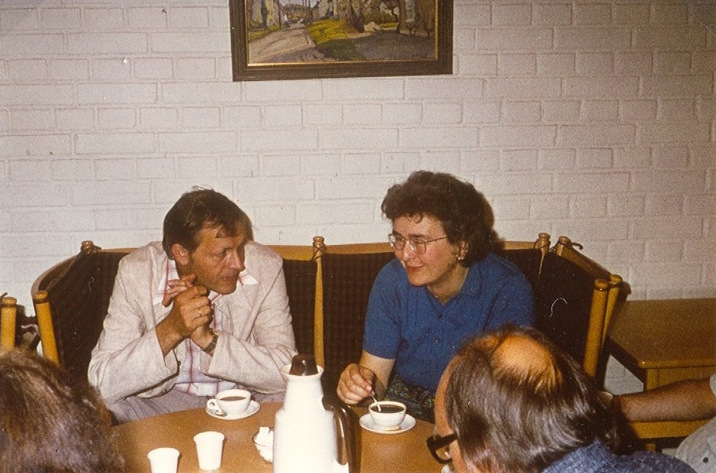Foreword by Tomas Sterner to Anna’s book which can be purchased here.
I first met Anna Shuttleworth when she taught at a Swedish summer music school in the mid seventies. She was staying with the musical Frankmar family in my hometown of Malmö. I played my cello to her and listened to her advice. Later I told my American cello teacher that Anna had taught me to ‘sing with the bow’, and I showed him how Anna had demonstrated a kind of wave movement
A year later my friend Ludwig, one of the Frankmar children, came to London to study with Anna. He wrote to me and I was also inspired to come. In 1977, at the age of seventeen, I had my first formal lesson with Anna at the Frankmars’ house in Malmö. First Anna punctured my own view of my cello playing by imitating me. She then asked me what I experienced when I thought of my family home. I answered that I saw the car in the front of the house, some trees, and the front door opening. She asked if I didn’t hear any sounds around the house, like birds singing or doors opening. It then dawned on me that my listening skills were poor and that I could really improve my playing if I followed Anna’s advice.
In September 1977 Anna and I travelled, in her white Renault 4, from Malmö to England with two cellos on the back seat, heads down. We took the Tor Line ferry from Gothenburg to Felixstowe – the boat was late, so Anna’s mother was very worried. I then enrolled on an A- level music foundation course at Maria Grey College, which was then located in southwest London, close to Richmond and the Thames. There I spent two great years losing my Swedish inhibitions and gaining anything musical that was on offer.
Ludwig and I usually had lessons together, and often Anna told us that our lessons would be from eight to ten. We then had to ask if it was in the morning or in the evening. If we were lucky it was a morning lesson, which would mean a crisp and cheerful Anna. If it was an evening lesson we would be sure that Anna was very tired and that she sometimes would shut her eyes when we played. Later, when I had been in London for a while, I was having a lesson with Anna; she gave me some instructions in very slow English, as if she was speaking to someone who had just arrived from abroad. I answered back, in very slow English, and said [with a Swedish accent] ‘I have now been in England for one and a half years and you can start speeding your speech up a little.’ Not only had my English improved but my cello playing was also getting better, and I auditioned and was accepted at both the Guildhall and the RCM.
This was in 1979 when Margaret Thatcher was elected Prime Minister in early May. One of the first changes she introduced was that foreign students had to pay full tuition fees. I was devastated by this and realised that I would not be able to return to England in the autumn. It was then discovered that students already accepted at a university or college would pay a reduced, but still high, fee. My parents did not have the money to pay, but eventually agreed to take out a loan on their house, and I became the black sheep of my family.
At the RCM I had two further years of study with Anna, followed by one year with Christopher Bunting and one with Joan Dickson. I fell for one of Joan’s students, and, in 1983, married Amanda Truelove. We went abroad for a few years; Amanda studied with Johannes Goritzki in Dusseldorf and I freelanced, mainly working for the Norrköping Symphony Orchestra in Sweden. I also worked hard to avoid getting drafted into the Swedish national service. When back in England, Anna let us rent the downstairs flat at 33 Stile Hall Gardens, her London home. We then later bought the downstairs flat from her and eventually the whole house.
A few years later, in 1996, I asked Anna to write down some memories of her life. I felt that I knew her well but that her life story was complicated. She agreed and slowly her handwritten pages started appearing together with numerous old programs, photos, critiques, letters, postcards and other vintage musical items.
Anna’s way of living seems, to me, to stem from a past era where musical discovery and experience were more important than being the best or well known. These feelings probably stems from her father and grandfather who were both intellectual and idealistic Englishmen. Anna once said to me ‘Some people buy nice carpets for their home, I like to travel instead.’ – You can imagine what her carpets are like! Through her work and travels she has made many friends and these friends and Anna’s musical experiences are what make her an extraordinary woman.
Reading Anna’s memoirs you understand that life has not always been easy. Her upbringing was constrained by the Second World War, and her eccentric retired father and Irish-Polish mother never seemed to have enough money. This probably explains why Anna has always worked so hard and also why she has been so generous to others who themselves have a hard time.
Anna is not always an easy person to deal with, and she often says exactly what she thinks. But, as someone commented, ‘Her bark is worse than her bite’, and I suppose that this ‘bark’ naturally led her to becoming a good teacher. In a world where honesty is a rare commodity, she speaks her mind and gives hope to cellists, some like me, who would never have got as far without that truthful musical injection she gives.

